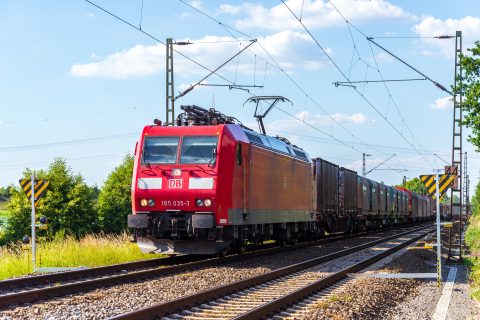GB Railfreight’s 10,000 trains to Drax

The UK has spent 4 July gripped in a general election. However, at least one part of the rail freight industry earned a vote of confidence. While the country went to the ballot box, GB Railfreight was fulfilling its own manifesto pledge with a milestone achievement on the same day. The carrier completed the delivery of its 10,000th biomass train from Liverpool to Drax Power Station, North Yorkshire.
GB Railfreight has been in office for eight years on behalf of the Drax Energy Group. Since 2016, GB Railfreight’s trains have moved over fifteen million tonnes of sustainable biomass between Peel Ports, Liverpool and Drax Power Station in Selby, Yorkshire. The biomass hauled by these 10,000 train journeys – equivalent to three journeys per day – supports Drax Power Station to provide enough power for up to four million homes and businesses.
Economic stability and national security
Sustainable biomass has become vital for the UK economy in the transition to net zero and the decarbonisation of the national grid – the power distribution network around the country. The volume of biomass makes rail the only realistic means of transporting the necessary quantities inland from the ports that serve the Drax Power Station complex. The power station site at Selby provides around eight per cent of the UK’s renewable energy and around four per cent of the country’s total electricity usage.

“We’re hugely proud of our partnership with Drax and Peel,” said John Smith, the Chief Executive of GB Railfreight. “As we have seen in recent years, the UK’s long-term energy security is a key component of economic stability and national security. The 10,000 journeys we have made over the last eight years have supported Drax and the UK Government to produce low carbon power for us all. This power has provided for families and businesses up and down the country, helping ensure that everybody’s needs are fulfilled – from keeping the central heating on in the winter to powering our electric vehicles.”
Liverpool development helps keep Drax viable
While the recent news at Liverpool has been of the planned expansion of the intermodal handling facilities at the port, it has been the bulk handling of biomass that has provided a steady flow. “Ports are central to powering the whole country in many ways,” said Jon Hassett, Deputy Port Director, Peel Ports Mersey Cluster. “Our relationship with Drax and GB Railfreight is a perfect example of how we work with customers to improve our collective environmental performance. We’re proud to have invested GB£100m (€119m) at our biomass terminal to make this happen and to see our port rail connections so well used.”

Drax Power Station was originally built as a coal-fired facility but has progressively been refitted to burn biomass as its prime fuel source. Many of the wagons now used to move the wood-based fuel were converted from redundant coal hoppers. The volume of road traffic that would otherwise be required would make the connoted use of the generating station unviable. “Drax Power Station’s supply chain partners play a critical role in helping us to keep the lights on for millions of homes and businesses in the UK no matter the weather,” said Mark Gibbens, Head of Logistics at Drax. “We have longstanding relationships with both GB Railfreight and Peel Ports and we are delighted to celebrate this incredible milestone with both of them.”
You just read one of our premium articles free of charge
Want full access? Take advantage of our exclusive offer





